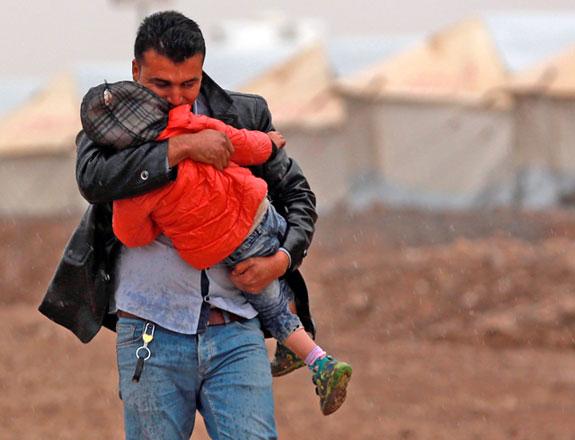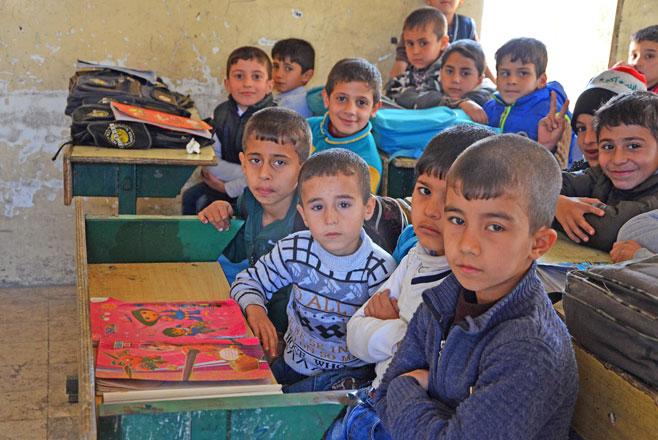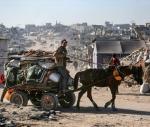You are here
Iraqi children battle trauma after life under Daesh rule
By AFP - Dec 15,2016 - Last updated at Dec 15,2016

A displaced Iraqi man, who fled fighting between Iraqi security forces and Daesh militants, carries a child during a rainfall in the Hasansham camp for displaced people, east of Mosul, Iraq, Wednesday (AP photo)
Hasansham camp, Iraq — Years of life under extremist rule and war have left thousands of Iraqi children old beyond their years and in desperate need of playtime to overcome their trauma.
Malak, 11, says she has "come back from hell".
She huddles in a long black coat at the Hasansham displacement camp where thousands of people have lived since fleeing their homes in Mosul where Iraqi forces are fighting to oust the Daesh terror group from its stronghold.
"Now that we are here, my dad is doing better," Malak says.
In this camp, between classes and play sessions, these young Iraqis are "becoming children again", says Maulid Warfa of the UN's children agency UNICEF.
"They have seen destruction, they have seen death, they've lived in the middle of fierce fighting, they've seen enormous explosions. All that has an impact on children's psychological and social wellbeing."
Children make up half the Iraqi population and a similar proportion of those displaced from Mosul.
Many have seen their childhood cut short as they take on the responsibility of supporting impoverished, bereaved and displaced families.
"They need to leave their tents and speak to people who will listen to them, rather than hearing their parents talking about war," said Suzdar Saleh, a psychologist from the NGO Terre des Hommes.
Back to school
In the camp's alleyways, girls help their mothers wash laundry while boys wrapped in sodden woollen clothes help their fathers carry food packages distributed by aid groups.
Faysal, also 11 and the oldest of five children, says life here is tough.
"We want to go home, my father can't find work, we're cold here and we eat badly," he says as heavy rain pounds on the UN tent that has become his new school.
Many of the children have not been to regular school since Daesh extremists took over their region in 2014.
Malak attends classes at the UNICEF centre every day. She says she wants to be a journalist or a doctor, despite having spent two years out of school.
Daesh militants ran schools in her village near Mosul, but it was expensive, and girls had to wear a long black veil.
“They didn’t teach us anything so we could become engineers or doctors, but only ‘one machine gun plus one machine gun equals two machine guns’,” she says.
Iraq once led the region in terms of children’s access to healthcare and education.
Today, at least one in three Iraqi children is in need of humanitarian aid and more than 3.5 million are out of school, UNICEF says.
Since it took over much of northern Iraq and declared Mosul the capital of its “caliphate”, Daesh has forcefully recruited young men and forced girls into sexual slavery.
Malak, who lived with her five siblings and her parents, was constantly afraid under the extremists’ rule.
“My dad was a policeman before, and [Daesh] came and threatened to cut his throat,” she says.
Never-ending noise
Despite the cold and hardship of life under canvas, she says the family is happier now, especially her father.
“Dad and mum play with us, they make us laugh so we will forget, because we got our lives back after leaving hell,” she says.
Faysal says he cannot forget “the explosions, the planes, the bombs” that forced his family to flee their house and seek refuge with relatives on the edge of Mosul.
“The noise was never-ending, we couldn’t sleep,” he says, his eyes constantly moving.
Saleh says noise is a constant theme in her therapy sessions with the children.
“Sometimes, they hear a plane fly over and they think the things they have been through are starting again,” she says.
The children need to express themselves in order to get over their traumas, she says.
On top of their own fear, “they have inherited the fear transmitted by their parents”, she says. “When they speak, they push out some of the suffering inside them.”
It will be a long time before Faysal overcomes his trauma, but he has already passed through a crucial step.
“I’m happy,” he says. “Now I can sleep.”
Related Articles
HASANSHAM CAMP, Iraq — Living conditions in west Mosul, where extremists are hunkering down among 750,000 Iraqi civilians, are deteriorating
KOS, Greece — When the Daesh terror group took over their Iraqi city and burned down the family's home, two teenaged brothers decided to ris
MOSUL, Iraq — On a classroom whiteboard in the battered city of Mosul the words "rediscovering how to smile" outline the heartbreaking task















